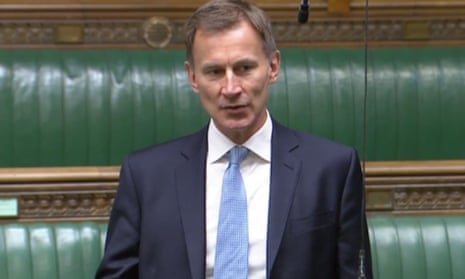The former Tory health secretary Jeremy Hunt and Labour launched stinging attacks on the government on Wednesday as it unveiled long-awaited social care reform plans lacking significant new funding to resolve the current crisis.
The white paper confirmed new spending including £300m over three years to help councils increase the range of supported housing options which allow people to live more independently, £150m to drive the greater adoption of technology, as well as details of £500m for workforce development, primarily through training and qualifications. There were also plans for a new national social care website and money for modifications to people’s homes to help them stay in them longer.
But amid a staffing crisis in which about 60,000 workers quit between April and October and 1.5m hours of commissioned care have not been delivered in England in recent months, the plans were widely criticised.
Hunt, who chairs the Commons health and social care select committee, told the care minister Gillian Keegan the plans would do nothing to stop “hospital wards continuing to be full of people who should be discharged and older people not getting the care they need because the carers don’t exist”.
He described it as “three steps forward and two steps back” and said the spending plans of around £1bn it outlined were “a long way off” the £7bn a year extra the health and social care select committee called for by the end of the parliament.
Labour’s Liz Kendall, the shadow care minister, said: “Ministers have utterly failed to deal with the immediate pressures facing social care as we head into one of the most difficult winters on record.”
She said: “Hundreds of thousands of older or disabled people [are] being left without vital support, piling even more pressure on their families at the worst possible time, yet the minister has announced absolutely nothing to deal with any of this.”
“Where was the long-term strategy to transform the pay, terms and conditions of care workers?” she said. “Can she tell me how some kind of website is going to pay a care worker’s bills or put food on the table? No wonder staff are leaving the sector in droves.”
On Wednesday, the Nuffield Trust estimated that in the six months to October the number of social care staff in England fell by between 50,000 and 70,000. Low pay, exhaustion after 18 months tackling Covid and the “no jab, no job” policy are key reasons.
Keegan stressed that the 103-page plan – called People at the Heart of Care – was a 10-year vision and “an important step on our journey to giving more people the dignified care that we want for our loved ones, setting out important changes that will last for generations and will stand the test of time”.
She also defended the design of controversial plans to cap care costs at £86,000, which would allow wealthy people to keep a greater proportion of their assets than poorer people who still stand to lose their homes to pay long-term care bills.
“No one will be worse off compared to the current system and many people will be better off,” she said.
But the King’s Fund said the measures failed to “fix social care” as Boris Johnson promised he would do “once and for all” in July 2019.
Sally Warren, the thinktank’s director of policy, said: “The government’s commitments do not match the ambition set out by the prime minister and urgency of change which the people who draw on care and support rightly expect to see.
“There is little to tackle poor workforce pay and conditions and high vacancy levels in the sector.”
The council social services group Adass welcomed it as “a foundation stone” which “paints a promising picture of a more professionalised care workforce in the future”.
But Stephen Chandler, its president, said: “What we urgently need now is a bridge to that brighter future, to address the immediate crisis and ensure that everyone gets the care and support they need this winter.”
The focus on the quality of care, housing and innovation using technology was welcomed by the National Care Forum, which represents providers. Its director, Vic Rayner, said it offered a “different vision for care that starts from the perspective of people who receive care”. But she said urgent action over the next four months was needed to tackle the crisis now.
Caroline Abrahams, a director of the charity Age UK, said: “Millions of older and disabled people putting up with inadequate services … needed the [white] paper to turbo-charge a process of transformation, but that was never going to be possible with the meagre funding allocated by the Treasury … Rather than the Formula One vehicle that was required, the paper is an underpowered saloon car at best.”










